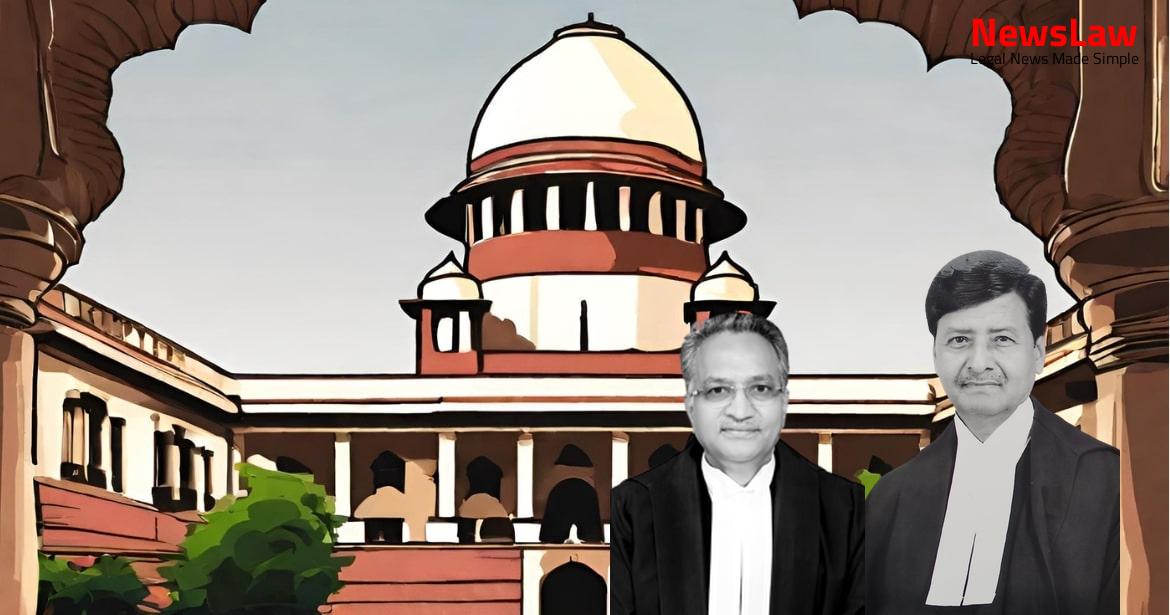In a legal case regarding a reconstruction dispute, the Appellant and Respondent have been at odds over possession and reconstruction rights. The Court has intervened to ensure a fair outcome for both parties involved. Stay tuned for more updates on this intriguing case.
Facts
- The appellant, owner of premises in Himachal Pradesh, had inducted the father of the respondent as a tenant in 1969 for non-residential use.
- Appellant filed eviction proceedings before Rent Controller on grounds of reconstruction and demolition.
- Rent Controller decreed the suit for eviction on 28.11.2013 due to bonafide need for reconstruction.
- Appellant changed advocate and filed a review petition claiming the previous statement was made without instructions regarding re-induction of the tenant.
- Review petition was dismissed on 24.8.2016 by the High Court of Himachal Pradesh.
- Special leave petitions were listed for admission on 9.1.2017 with discussions on room allocation and rent rates in the area.
- Petitioner was directed to hand over vacant possession by 31 October, 2016 and pay use and occupation charges till then.
Also Read: Land Acquisition Challenges for Integrated Infrastructure Project
Arguments
- Respondent-tenant was willing to handover possession subject to re-induction as tenant in equivalent area.
- Appellant agreed to the offer made by the tenant.
- Civil revision disposed off with conditions: construction work to be completed within one year, tenant to be re-inducted in equal area within one month of completion.
- Respondent is not allowing the petitioner to demolish the building.
- Petitioner is being restricted from going ahead with construction.
- Issue of hindrance in demolition and construction process raised by the petitioner.
Also Read: Legal Interpretation of Mortgage Validity in Auction Dispute
Analysis
- Lawyers owe fiduciary duties to their clients and must follow client instructions rather than substitute judgment.
- Lawyers generally have no implied authority to make admissions or statements that surrender the client’s substantial legal rights, unless it is necessary for the purpose of representation.
- Admissions made by a counsel are binding on their principals as long as they are unequivocal.
- A client is not bound by a statement or admission made by their lawyer if they were not authorized to make it.
- The lawyer-client relationship is based on agency status, where lawyers act on behalf of the client on the subject matter of the retainer.
- Lawyers should seek appropriate instructions from the client before making any concession that may affect the client’s legal rights.
- The appellant is bound by the unequivocal statement made before the Court to re-induct the respondent-tenant in the newly constructed building and provide the same area as before.
- The appellant cannot extricate himself from the obligation given to the Court and must be bound by it.
- The width of the offered premises may not be sufficient to accommodate the respondent’s needs.
- The delivery of possession of the premises to the appellant was expedited after the Court’s intervention, as the appellant had expressed willingness to spare a portion of the premises for the respondent.
- The current arrangement is the most equitable for all parties involved.
- It aims to provide complete justice to the parties.
- The decision is based on the specific fact situation of the case.
- The arrangement is fair and balanced.
- It ensures that all parties are treated fairly.
Also Read: Interpretation of Provisions in the 1946 Act: Jurisdiction of the CBI
Decision
- The appellant is directed to compensate the respondent for the loss of area by paying Rs.74,000/-
- The Chief Administrative Officer of the District Court is appointed as a receiver to ensure compliance of the terms and report any breaches
- The appellant is prohibited from using the first and second floors until payment of compensation is made
- Both parties are directed to file a joint application before the Rent Controller for determination of monthly rent upon re-induction of the respondent
- The appellant is to provide access to the first and second floors from the rear side of the building
- Failure to hand over vacant possession by the specified date gives respondent-landlord the right to execute eviction order
- The respondent-landlord must complete construction by a certain date and re-induct the petitioner-tenant in the newly constructed building thereafter
- If construction is not completed on time, the respondent-landlord must pay damages at the rate of Rs.1,000/- per day until re-induction of the tenant
- The appellant must provide the entire front portion of the ground floor premises to the respondent by erecting a brick wall to separate the back end
- The Rent Controller to decide the rental terms expeditiously within six months
- The appellant to immediately erect a brick wall to divide the ground floor premises into two parts
- The High Court’s order is modified accordingly
- No costs are awarded in this matter
Case Title: OM PRAKASH Vs. SURESH KUMAR (2020 INSC 111)
Case Number: C.A. No.-000833-000834 / 2020



